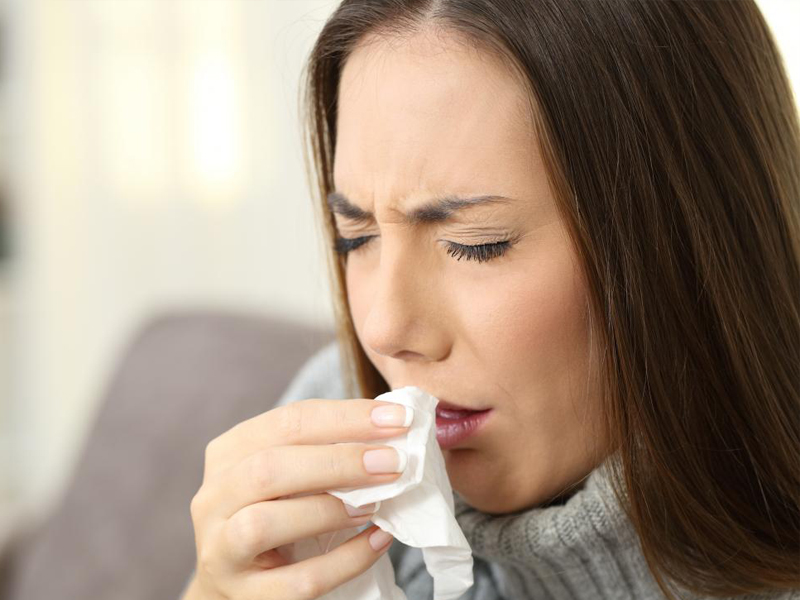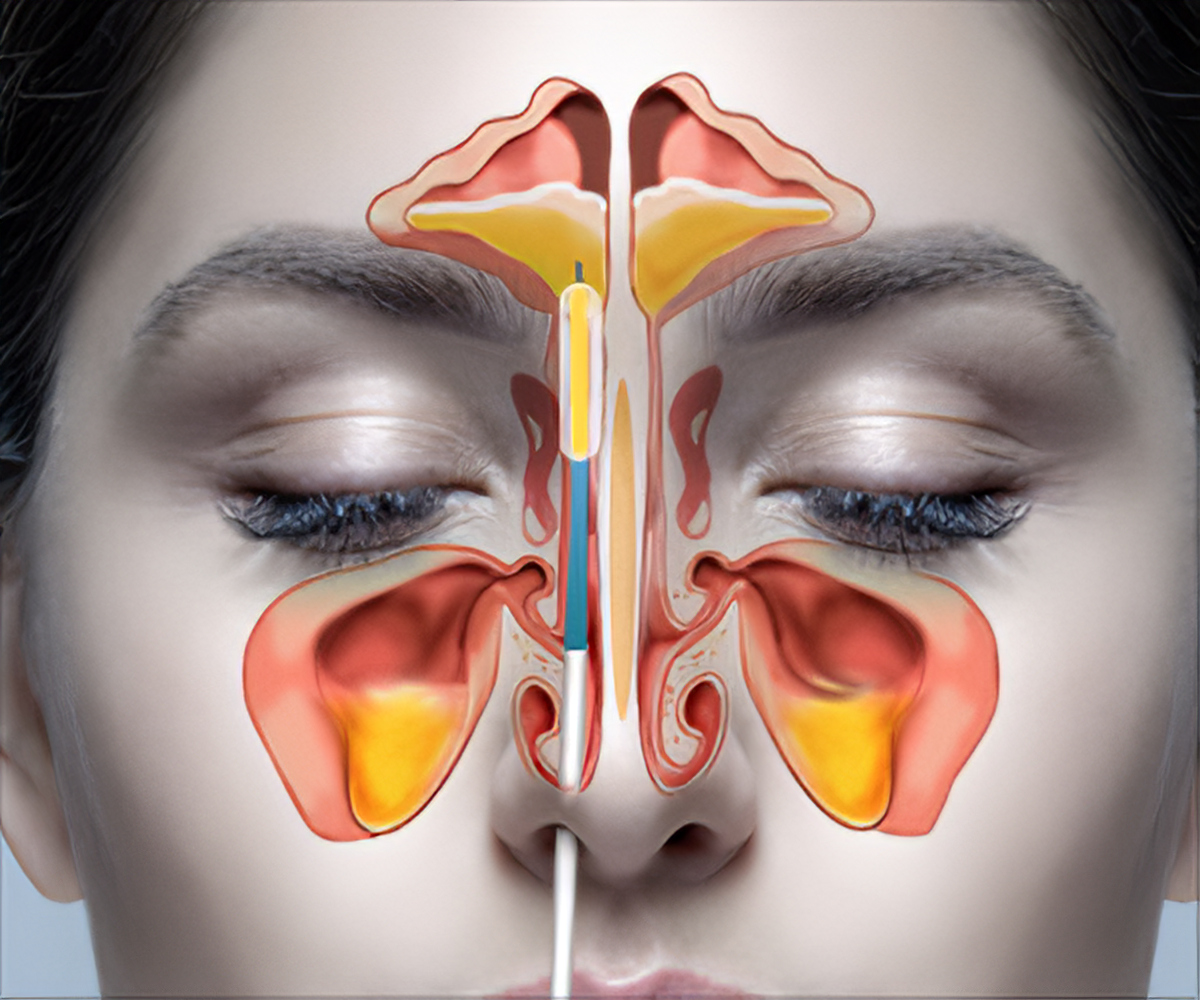Sinusitis treatment involves the removal of inflammation that can cause the sinuses to become blocked and filled with fluid. It is usually caused by a cold or allergies, and infection may occur due to this blockage.
Sinusitis Treatment
What is sinusitis?
Sinusitis is inflammation or swelling of the tissue lining the sinuses. The sinuses are four paired cavities in the head. They are connected by narrow channels. Sinuses produce thin mucus that drains through the nasal passages. This drainage helps keep the nose clean and free of bacteria. Sinuses, which are normally filled with air, can become blocked and filled with fluid. When this happens, bacteria can grow and cause an infection (bacterial sinusitis).
This is also called rhinosinusitis, with “rinho” meaning “nose.” If the sinus tissue becomes inflamed, the nasal tissue almost always swells.
What are the different types of sinuses near the nose and eyes?
Paranasal sinuses are located in your head, near your nose and eyes. They are named after the bones that provide their structure.
- The ethmoid sinuses are located between your eyes.
- The maxillary sinuses are located under your eyes.
- The sphenoid sinuses are located behind your eyes.
- The frontal sinuses are located above your eyes.
The largest sinus space is the maxillary space and is one of the most commonly infected spaces.
There are different types of sinusitis:
- Acute bacterial sinusitis: This term refers to a sudden onset of cold symptoms such as runny nose, nasal congestion, and facial pain that do not go away after 10 days, or symptoms that appear to improve but then return and are worse than the initial symptoms. (called “double disease”). It responds well to antibiotics and decongestants.
- Chronic sinusitis: This term refers to a condition characterized by nasal congestion, drainage, facial pain/pressure, and decreased sense of smell for at least 12 weeks.
- Subacute sinusitis: This term is used when symptoms last four to twelve weeks.
- Recurrent acute sinusitis: This term is used when symptoms return four or more times within a year and last less than two weeks each time.
Who gets sinusitis?
Sinus infection can happen to anyone. However, people with nasal allergies , nasal polyps, asthma, and abnormal nasal structures are all more likely to get sinusitis. Smoking may also increase your frequency of sinus infections.
There are an estimated 9 million people with sinusitis in our country. Sinusitis treatment is usually done with antibiotics. Sinusitis is also treated with steroids (Cortisone). In advanced cases, surgery may be required to treat sinusitis.
How do I know if I have a sinus infection, cold, or nasal allergy?
It can be difficult to tell the difference between a cold, allergies, and sinus infection. Colds typically build, peak, and gradually fade away. It lasts from a few days to a week. A cold can turn into a sinus infection. Nasal allergy is inflammation of the nose due to irritating particles (dust, pollen and dandruff). Symptoms of nasal allergy include sneezing, itching in the nose and eyes, congestion, runny nose, and postnasal drip (mucus in the throat). Sinusitis and allergy symptoms may occur at the same time as a cold.
If you’re fighting a cold and develop sinus infection or nasal allergy symptoms, see your healthcare provider. You will be asked to describe your symptoms and medical history.
What causes sinusitis?
Sinusitis may be caused by a virus, bacteria or fungus that swells and blocks the sinuses. A few specific reasons include:
- Cold.
- Nasal and seasonal allergies, including mold allergies.
- Polyps (growths).
- A deviated septum. Septum is the line of cartilage that divides your nose. A deviated septum means it is not straight, so it is closer to the nasal passage on one side of your nose, causing a blockage.
- A weak immune system caused by disease or medications.
For babies and young children, spending time in nurseries, using a pacifier or drinking a bottle at bedtime can increase the chance of getting sinusitis. For adults, smoking increases the risk of sinus infections.
Is sinusitis contagious?
You can’t spread bacterial sinusitis, but you can spread viruses that cause sinusitis. Remember to follow good handwashing practices, stay away from people if you are sick, and cough into your elbow if you must sneeze or cough.
What are the signs and symptoms of sinusitis?
Common signs and symptoms of sinusitis include:
- Post-nasal drip (snot drips down the throat).
- Runny nose (thick yellow or green discharge from nose) or nasal congestion
- Facial pressure (especially around the nose, eyes, and forehead), headache, and/or pain in your teeth or ears.
- Bad breath (bad breath)
- Cough.
- Tiredness.
- Fire.
How is sinusitis diagnosed?
Your healthcare provider will ask you many questions to create a detailed medical history and learn about your symptoms. A physical examination will also be performed. During the exam, your doctor will check your ears, nose, and throat for any swelling, discharge, or congestion. An endoscope (small light/optical instrument) may be used to look inside the nose. If you need an imaging exam, your doctor will order a computed tomography (CT) scan.
How is sinusitis treated?
Sinusitis is treated in a variety of ways, each depending on how severe your case of sinusitis is.
A simple sinus infection is treated with:
- Decongestants.
- Over-the-counter cold and allergy medications.
- Nasal saline irrigation.
- Drinking fluids (sinusitis is a viral infection and fluids will help).
If sinusitis symptoms do not improve after 10 days, your doctor may prescribe:
- Antibiotics (seven days in adults, 10 days in children).
- Oral or topical decongestants.
- Prescription intranasal steroid sprays. (Do not use nonprescription sprays or drops for longer than three to five days—they can actually increase congestion).
Long-term (chronic) sinusitis can be treated by focusing on the underlying condition (typically allergies). This is usually treated as follows:
- Intranasal steroid sprays.
- Topical antihistamine sprays or oral pills.
- Leukotriene antagonists to reduce swelling and allergy symptoms.
- Flushing the nose with saline solutions, which may also contain other types of medications.
When sinusitis is not controlled by one of the above treatments, a CT scan is used to get a better look at your sinuses. Depending on the results, surgery may be required to correct structural problems in your sinuses. This is more likely if you have polyps and/or a fungal infection.
What are the complications associated with sinus infection?
Although not very common, untreated sinus infections can be life-threatening by causing meningitis or infecting the brain, eyes, or nearby bone. Meningitis is an infection of the membranes (meninges) covering the brain and spinal cord.
Do I need antibiotics for every sinus infection?
Many sinus infections are caused by viruses that cause the common cold. These types of infections are not treated with antibiotics. Taking antibiotics for a viral infection unnecessarily puts you at risk for antibiotic-related side effects. Additionally, overuse of antibiotics can lead to antibiotic resistance, making future infections harder to treat.
Are complementary and alternative treatments useful in the treatment of sinusitis?
You may find acupressure, acupuncture, or facial massage to help reduce sinusitis symptoms, including pressure and pain. They can also help you relax. These treatments generally do not have any unwanted side effects.
Is there a correct way to blow your nose?
If you have a stuffy nose, trying to force yourself to blow your nose can make it worse. The best thing to do is to gently blow one side of your nose into a tissue. You may want to use some type of nasal rinse to loosen any debris in your nose before blowing. Be sure to discard the tissue and then clean your hands with soap and water or an antimicrobial disinfectant.
How can I prevent sinusitis?

Sinusitis Treatment
Some home remedies used to treat sinus infection symptoms may help prevent sinusitis. These include rinsing your nose with salt water and using medications your provider may recommend, such as allergy medications or steroid nasal sprays.
You should avoid things you are allergic to, such as dust, pollen or smoke, and try to stay away from sick people. Wash your hands to reduce your chances of catching a cold or flu.
Will I need to make lifestyle changes to deal with sinus infections?
If you have indoor allergies, it is recommended that you avoid triggers (e.g. pet dander and dust mites) and also take medication. Smoking is never recommended, but if you smoke, strongly consider a program to help you quit. Smoke can also trigger allergies and prevent mucus from being picked up by the nose. There is no need for a special diet, but drinking extra fluids will help thin out nasal secretions.
When should I see a doctor for a sinus infection?
It’s pretty easy to care for most sinus conditions on your own. However, if you continue to have symptoms that worry you or if you continue to have infections, be sure to consult your specialist.
Sinusitis, or swelling of the tissues of the sinus cavities, is a common condition that has many causes, including viruses and bacteria, nasal polyps, or allergies. There may be signs and symptoms such as facial pressure, fever, and fatigue. You can treat symptoms at home by resting, taking over-the-counter products, and increasing your fluid intake. If your symptoms do not improve, if sinusitis occurs frequently, or if you have any symptoms that worry you, be sure to consult your doctor .
Generally, many patients apply for sinusitis treatment even though they do not have sinusitis. Many migraine sufferers may think they need sinusitis treatment. This is a common situation. Sinusitis is mistakenly known as the first diagnosis among the public as the cause of headache. If you want to be diagnosed, you should definitely consult a specialist physician first. Applications such as botox for migraine can solve your problem. You can contact us for sinusitis treatment and diagnosis






